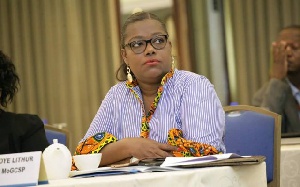 Minister of Gender, Children and Social Protection, Nana Oye Lithur
Minister of Gender, Children and Social Protection, Nana Oye Lithur
The Minister of Gender, Children and Social Protection, Nana Oye Lithur, has said the ongoing Ghana National Household Registry (GNHR) would greatly enhance the nation’s poverty reduction efforts.
She said the register would establish a database of households from which all social protection programmes in Ghana would have the opportunity to select their beneficiaries.
Nana Oye Lithur said this during the launch of the GNHR data collection exercise in Wa which was held under the theme: “Single Household Registry: Towards Improving Efficiency in Social Protection”.
She said a single household register would make targeting process much more effective and thereby strengthen the numerous government social intervention programmes. She said data from the registry would also be used for public policy planning and management as well as research development in the areas of social protection for the poor and vulnerable in the society.
The Gender Minister said a similar policy also succeeded in Mexico and especially in Brazil where poverty was reduced from 36 per cent to 17.9 per cent. Nana Oye Lithur said Ghana was the first Sub-Saharan country to halve poverty in 2013 and expressed optimism that Ghana would be able to meet the Sustainable Development Goal (SDG1) by 2030.
The exercise which is beginning from the Upper West Region is expected to register 112,000 households. Alhaji Amidu Sulemana, Upper West Regional Minister, gave his full support to the data collection exercise and urged the Municipal and District Assemblies to assist the GNHR to educate the communities about the importance of the exercise to enable them participate fully.
The Regional Minister also called on traditional rulers, religious and community leaders to play their part in mobilizing their communities for the exercise. Alhaji Sulemana said the region was first to take the exercise and that there is the need for them to ensure that they set a good precedent for the rest of the country to follow.
Mr Robert E. Austin, Coordinator, Ghana Social Opportunities Project (GSOP), said the GNHR Team was aware of how the accuracy of the data they collected would be crucial in achieving the main objective of establishing the National Household Registry.
“To this effect, we have hired, through free, fair and transparent international competitive bidding process, a Data Collection and Software Solution (DCSS) firm Messrs Genkey Solutions BV, to help them in the data collection process”, he said.
Mr Austin said the census approach would be adopted and that enumerators would move from house-to-house using electronic devices with capacity to take photographs, scan finger prints and ID cards and type in the answers of households to questions during the registration process.
Naa Dr Ernest Sagsor-Tulong I, Chairman of the Occasion, said the household register data was so critical for decision making and appealed to the data collectors to ensure that the effort is a success.